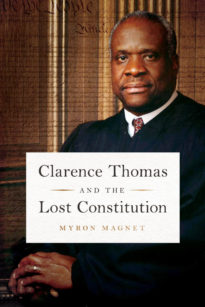Court watchers assumed the two justices were arguing about abortion, although the case had nothing to do with that issue. But the clash over stare decisis—the doctrine that courts must respect precedent as binding—runs far deeper. It is a manifestation of the crisis of legitimacy that has split Americans into two increasingly hostile camps.
On Justice Thomas’s side is the belief that the government’s authority rests on the written Constitution. This view regards a self-governing republic—designed to protect the individual’s right to pursue his own happiness in his own way, in his family and local community—as the most just and up-to-date form of government ever imagined, even 232 years after the Constitutional Convention.
Justice Breyer, by contrast, assumes America is rightly governed by a “living Constitution,” which evolves by judicial decree to meet modernity’s fast-changing conditions. Judges make up law “with boldness and a touch of audacity,” as Woodrow Wilson put it, rather than merely interpreting a Constitution he thought obsolete.
Wilson also established a corps of supposedly expert, nonpartisan administrators in such agencies as the Interstate Commerce Commission and the Federal Trade Commission, to make rules like a legislature, carry them out like an executive, and adjudicate and punish infractions of them like a judiciary. Wilson and Franklin D. Roosevelt, who supersized this system, considered it the cutting edge of modernity in the protection it afforded workers and the disadvantaged. Call it the Fairness Party, as distinct from Justice Thomas’s Freedom Party.
The Freedom Party does not view the rule by decrees of unelected officials, however enlightened, as an advance over democratic self-government. If the framers had wanted such a system, they could have stuck with the unwritten British constitution, which had governed the American colonists for 150 years and evolves by judicial precedent. They wanted a written constitution, strictly limiting federal authority, because they knew that human nature’s inborn selfishness and aggression not only make government necessary but also lead government officials to abuse their power if not restrained.
U.S. history justifies the framers’ caution, as Justice Thomas has argued in hundreds of opinions since joining the court in 1991. At crucial junctures, the Supreme Court has twisted the Constitution that guarantees liberty toward government oppression.
Start with The Slaughter-House Cases (1873) and U.S. v. Cruikshank (1876), which blew away the protection of the Bill of Rights with which the 14th Amendment’s framers and ratifiers thought they had clothed freed slaves against depredations by state governments. The result was 90 years of Jim Crow tyranny in the South. “I have a personal interest in this,” Justice Thomas once said. “I lived under segregation.” He grew up in 1950s Savannah, Ga., where the law forbade him to drink out of this fountain or walk across that park. If the Fairness Party thinks Supreme Court distortions can twist only to the left, it should think again. Far better to stick to the original meaning, as Justice Thomas urges.
Look what happened when the court allowed Congress and the president to proliferate administrative agencies with no political accountability. The justices have “overseen and sanctioned the growth of an administrative system that concentrates the power to make laws and the power to enforce them in the hands of a vast and unaccountable administrative apparatus that finds no comfortable home in our constitutional structure,” Justice Thomas wrote in a 2015 opinion, the first of a series that argued for reining in the administrative state.
Read more in the Wall Street Journal.
